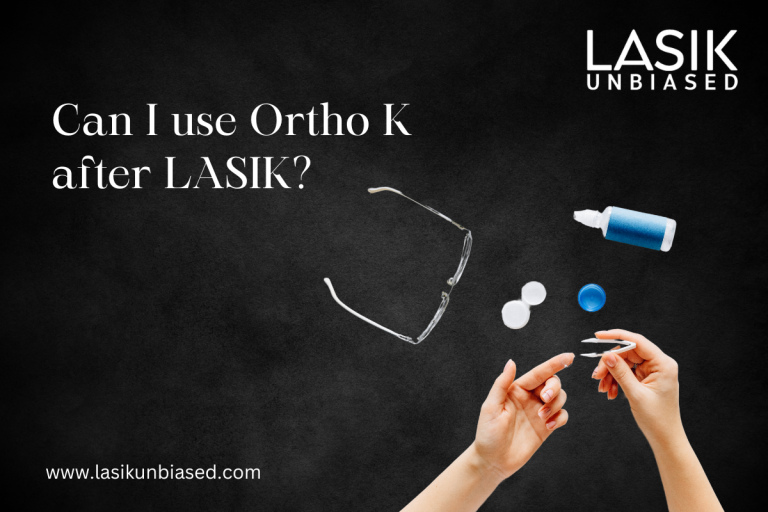LASIK has helped millions achieve clear vision without glasses or contact lenses, but some individuals may still experience vision changes over time.
Orthokeratology, commonly known as Ortho-K, is a non-surgical vision correction method that involves wearing specially designed gas-permeable contact lenses overnight to reshape the cornea temporarily. Many people who have undergone LASIK wonder if they can use Ortho-K to fine-tune their vision or manage any post-surgical changes. Understanding the relationship between Ortho-K and LASIK can help individuals determine if this option suits them.
Understanding Ortho-K and Its Purpose
Ortho-K lenses are custom-designed to reshape the cornea while a person sleeps. By gently flattening or adjusting the corneal surface, these lenses help correct refractive errors such as myopia (nearsightedness), hyperopia (farsightedness), and mild astigmatism. The effects of Ortho-K are temporary, and regular use is necessary to maintain clear vision. Unlike LASIK, which permanently alters the corneal shape, Ortho-K provides a reversible, non-surgical alternative for vision correction.
Why Would Someone Consider Ortho-K After LASIK?
While LASIK is highly effective, some patients may still experience vision changes due to ageing, hormonal fluctuations, or the natural progression of refractive errors. Sometimes, LASIK results may regress slightly, leading to mild nearsightedness or astigmatism. Instead of undergoing another surgical procedure, some individuals explore Ortho-K to refine their vision without additional surgery.
Ortho-K may also be considered for patients who develop presbyopia, a common age-related condition that affects near vision. Since Ortho-K can be customized for monovision correction—where one eye is adjusted for distance vision and the other for near vision—it can offer a non-invasive solution for those who wish to avoid reading glasses.
Can Ortho-K Be Used After LASIK?
Yes, Ortho-K can be used after LASIK, but it requires careful evaluation by an eye specialist. Since LASIK reshapes the cornea permanently, the post-surgical corneal surface may differ from that of someone who has never had laser eye surgery. Ortho-K lenses must be specially designed to fit the altered corneal shape.
A thorough eye examination, including corneal topography, must assess whether Ortho-K is viable for a post-LASIK patient. If the corneal shape and thickness are suitable, a customized Ortho-K lens can be designed to provide adequate vision correction.
Challenges of Using Ortho-K After LASIK
Irregular Corneal Shape
LASIK alters the cornea in a way that can make fitting Ortho-K lenses more complex. Post-LASIK corneas often have a flatter central zone with a steeper peripheral area. Standard Ortho-K lenses are designed for naturally shaped corneas, so they may not fit as well on a post-LASIK cornea. Specialized Ortho-K lenses or customized fitting may be required to ensure proper effectiveness and comfort.
Limited Effectiveness
Ortho-K works best on corneas with a predictable and uniform curvature. Since LASIK changes the natural curvature of the eye, Ortho-K lenses may not provide the same level of correction as they would for someone who has never had laser eye surgery. Some patients may achieve only partial improvement in vision, while others may need additional adjustments to their lenses over time.
Potential Discomfort
Because the post-LASIK cornea has a different shape, Ortho-K lenses may feel slightly less comfortable than individuals with naturally shaped corneas. Some patients may need multiple lens fittings to achieve optimal comfort and effectiveness.
Benefits of Using Ortho-K After LASIK
Non-Surgical Vision Correction
One of the most significant advantages of Ortho-K after LASIK is that it allows vision correction without additional surgery. If vision changes occur years after LASIK, Ortho-K offers a temporary and reversible method to refine vision without undergoing a secondary laser procedure.
Preserves Corneal Integrity
Ortho-K provides a safe alternative for individuals who are not candidates for LASIK enhancement due to thin corneas or other eye health concerns. Since Ortho-K does not permanently alter the cornea, it can be discontinued if the patient prefers another vision correction method.
Effective for Nighttime Wear
Ortho-K lenses are worn only at night, making them convenient for people without glasses or contact lenses during the day. This can be particularly beneficial for those who engage in sports, outdoor activities, or professions where glasses or daytime contact lenses may be inconvenient.
Who Is a Good Candidate for Ortho-K After LASIK?
Patients with Mild Refractive Errors
Ortho-K may be a suitable option if a person experiences minor vision changes after LASIK. Those with slight myopia, mild astigmatism, or presbyopia can benefit from customized Ortho-K lenses to refine their vision.
Individuals Seeking a Reversible Solution
Some patients may want an alternative to glasses without committing to another surgical procedure. Ortho-K allows them to experience clearer vision without permanently altering their eyes again.
Patients Willing to Follow Lens Care Guidelines
Ortho-K requires diligent lens care and regular follow-ups with an eye doctor to ensure eye health and proper lens fit. Patients committed to maintaining hygiene and following instructions will have the best experience with Ortho-K.
Alternatives to Ortho-K After LASIK
If Ortho-K is not the right fit for a post-LASIK patient, other options are available for vision correction:
- Glasses or Contact Lenses: Traditional glasses or soft contact lenses can correct residual refractive errors after LASIK.
- LASIK Enhancement: In some cases, a secondary LASIK procedure may be an option to refine vision further.
- Refractive Lens Exchange (RLE): For patients experiencing age-related vision changes, RLE involves replacing the eye’s natural lens with an artificial intraocular lens to correct presbyopia and other refractive errors.
- Corneal Cross-Linking (CXL): If corneal irregularities develop post-LASIK, CXL can strengthen the cornea and improve its stability, making it easier to explore vision correction options.
Ortho-K can be a compelling vision correction option for some individuals who experience mild vision changes after LASIK. While it presents specific challenges due to the altered corneal shape, customized Ortho-K lenses can help improve vision without additional surgery. Patients considering Ortho-K after LASIK should consult an eye specialist for a thorough evaluation to determine if this option suits their needs. With proper lens fitting and care, Ortho-K can offer a safe, non-invasive way to maintain clear vision long after LASIK surgery.


